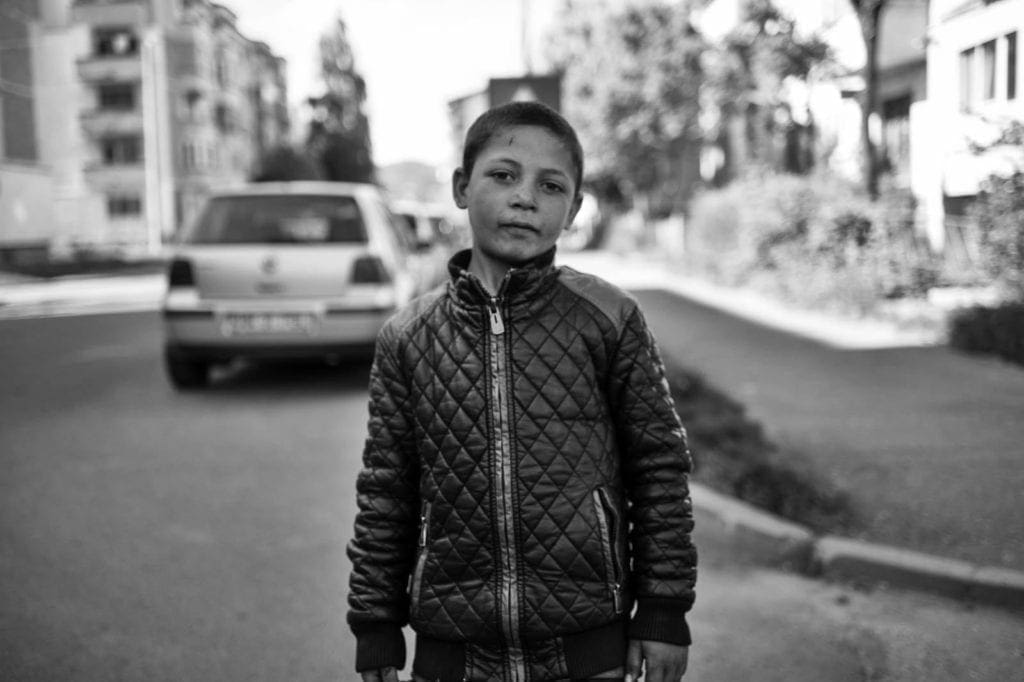Everyone has more or less strong moral qualms that present themselves in the most diverse ways. In fantasy, these act by setting a limit to conceivable baseness. The reality, for its part, has no such qualms. Few would think of writing a story in which children from the age of five onwards are addicted to inhaling glue, prostitute themselves to eat, live on the streets in poverty and survive thanks to someone’s good heart. Few could conceive of a living condition so borderline that they could ‘justify’ such things.
Yet these conditions exist, they are real and tangible, and they are not hundreds of thousands of kilometres from Italy. They are practically around the corner. This is the case of the Roma camps in Romania, inhabited not only by Roma but also Romanians, in Baia Mare to be precise, a town 700 kilometres north of the capital, in the heart of Transylvania. Among the six in the town, there is one in Craica. Not because it is worse in terms of living conditions, but because it is the needle of the scales, the border between completely isolated camps, Pirita, and buildings that are part of the urban context but in indescribable conditions as the Combinat or the former Coprom chemical factory. Among them, children play barefoot and ‘mindless’.
The buildings assigned by the communist regime are a perfect curtain to hide the camp. They mark a clear boundary, a real limit between two seemingly distant worlds. To reach the heart of Craica, one must cross a bridge under which runs a putrid canal whose waters overflow with all manner of nefariousness. A little further on a disused railway line around which the agglomeration of shacks has developed. Beyond the outermost rail track scattered hovels, more rubbish and a few horses.
As a village that should not exist, it lacks every minimum ‘civil’ support. Running water, as well as drinking water, electricity, sewers, and heating facilities. Some have ingeniously built a latrine a few metres from the dwelling. Others make do with nature. Inside, the buildings are small and cosy. One or two rooms at most. Where one cooks, with the help of improvised stoves built from bins or buckets, is also where one sleeps. If only for a mere case of necessity. It is the warmest room. On beds, improvised cots or simple mattresses thrown on the ground, an unknown number of blankets or cloths are piled up. The hope is that they will be enough to cope with a winter that in these areas reaches up to thirty degrees below zero. On the walls, not everyone has windows. They would disperse heat.

Between prostitution and glue addiction, the difficult childhood of Craica’s kids
Life in Craica flows trying to find ways to eat and not to get sick. There is a school. Or rather, Sister Gabriela, Gabriela Lucaci, makes the rounds of all the camps every day to collect the children and take them to a flat used as a school. At least here, for a few hours, no more, they seek redemption.
‘This ploy,’ says Sister Gabriela, ‘does not solve the glue problem. So many of them continue to inhale it. I can’t stop them from doing it, otherwise, I would lose the only chance of keeping them off the street. The only solution is to try to make them understand that there is another life beyond the one they have always seen”. Away from the street and prostitution, especially child prostitution, which is very much in vogue in Romania. Pushing them onto the street is the family itself. Children often suffer violence already in the family, only to be ready when they later have to do it to support themselves. And yes, because they will have to do it.
After the age of 14, the government will remove the family subsidy, a facility offered to finish compulsory schooling, and the children will be left to their own devices. The risk is that they will swell the ranks of those who sleep in the station, eat when Father Albano and the volunteers of the Somaschi association bring food, and live on prostitution and gimmicks while the town goes on with its life as if nothing happened and the problem does not concern anyone.
In the camp, one gets by with what one can. Not only with theft. Some survive by extracting iron from objects recovered from the ‘dump’, that is, every square metre surrounding the camp. This is the case of a young mother, in her mid-thirties. Three children, the eldest 11 years old, the second 9 years old and the youngest 6 years old. The father created another family a few years ago. The eldest often spends a few days with him and her grandparents, and although living conditions are a little better, she always returns to her mother and little brothers and sisters. The three children are intelligent, perceptive, and naive and always play in the field beyond the tracks, alone or together with other kids like them.
At first glance, it seems that their surroundings have had no influence on their lives as children, but then seeing them playing away from their shelter, one realises that they are in search of clean air, of something to colour their days. Even if where they live remains the poor and miserable shack where their mother and neighbours sniff glue all the time, it remains their home, despite the decay and toxic air, because their mother’s affection and embrace have not abandoned them.


